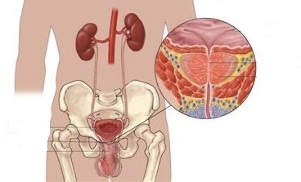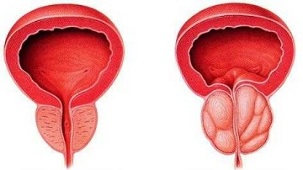Varieties of prostatitis and the cause of its development
Prostatitis is a disease of the prostate gland, accompanied by an inflammatory process in the tissues. Prostatitis is classified according to the following data:
- acute bacterial prostatitis caused by an infectious agent;
- chronic (infectious) bacterial prostatitis;
- chronic (non-infectious) abacterial prostatitis;
- symptomatic inflammatory prostatitis.
Chronic bacterial prostatitis - the nature of this species is not fully understood, although many studies have been done. This type occurs in the male body due to an infection of the prostate gland, which may be due to several reasons:

- severe hypothermia;
- problems emptying your bladder;
- unstable sex life (malpractice or lack thereof);
- equivalent to chronic diseases of the genitourinary system;
- living an unhealthy lifestyle;
- lack of mobility.
Often the disease persists without obvious symptoms, making it felt only during the worsening period, which is accompanied by symptoms such as:
- discomfort and incomplete emptying while urinating;
- decreased sexual activity;
- pain in the lower abdomen.
Moreover, chronic prostatitis can provoke various diseases of the bladder, move to the stage of acute manifestation of the disease, and then treatment of chronic prostatitis is given.
Chronic abacterial prostatitis - the incidence is 92-95% of all types of prostatitis, according to this data, one can assess its prevalence. The disease has no age limit, so it strikes men of all ages, but its peak on average falls at the age of thirty. The disease is diagnosed based on the following symptoms:
- the presence of painful discomfort (more than 3 months) in the pelvic organs;
- no signs of contagious environment;
- increases dysfunction of sexual activity and urination.
Chronic calculus prostatitis can also be distinguished in urology, which in turn is a consequence of chronic prostatitis and is more worrying for older men.
Can chronic prostatitis be cured?
Every patient is tormented by the question of the effectiveness of the treatment of chronic prostatitis, because the disease not only brings a lot of discomfort of a specific nature, but also brings some psychological trauma to a man.
Considering the various directions in the application of the method, we note that these appointments are made by experts based on diagnostic measures. Individual urologists create a comprehensive prostatitis treatment program, which includes a variety of therapeutic procedures. Therefore, a comprehensive conservative approach includes:
- treatment of chronic prostatitis medication;
- physiotherapy;
- manual therapy.
As noted, specialists select individual programs that undergo adjustments from the general scheme, and each patient individually is a separate treatment for chronic prostatitis, which is calculated by his or her doctor.
Effective treatment for chronic prostatitis mainly involves the following additional research:

- consultation of neurosurgeon, endocrinologist, cardiologist;
- perform magnetic resonance imaging of the brain or brain, to study its function and structure;
- hormonal state research;
- Ultrasound of the genitourinary system.
How to treat chronic prostatitis if the patient does not see symptoms? This case means that the patient is in the process of remission or his illness is not symptomatic, the latter case, of course, involves an immediate visit to a specialist who will perform all the necessary procedures. Treatment requirements for chronic prostatitis usually range from 2 weeks or more, depending on the condition of the prostate and the stage of the disease.
For example, drugs for the treatment of chronic prostatitis require constant administration in men, which in combination with this disease decreases arterial blood flow to the penis. And to increase this blood flow and cause erections, continuous vasodilating medication intake is required.
Treatment of chronic prostatitis at home
In the event of an increase in chronic prostatitis, all the recommendations stated below are followed. These are bed rest for several days, exclusion of physical activity, rejection of alcohol. After getting rid of chronic prostatitis inflammation, it is necessary to decide on your work and rest for many years.
To avoid recurring upgrades, the following basic guidelines must be followed at all times:
- Avoid hypothermia - first of all, exclude sitting on cold ground, concrete roads, rocks, even in summer. Clothes must be loose, light enough, but suitable for the season. The best way to get rid of the exacerbation of chronic prostatitis is by hardening the body. In this case, you can use hardening with water, water bath, daily in the open air for at least 1-2 hours.
- It is very important to empty the bladder regularly, avoid overflow and prolonged urinary retention ("do not tolerate", go to the toilet every 3-4 hours).
- If you have an inactive job, you need to rest for 3-5 minutes every one or two hours and take a walk, warming up. If this is not possible, you should do at least an anal withdrawal 40-50 times in one approach, repeating such exercises 4-6 times a day.
- Frequent moderate physical activity is one of the most important factors in preventing the worsening of chronic prostatitis, relieving congestion in the prostate gland and pelvic organs. The minimum activity is daily morning exercise, walking at a moderate or fast pace for 30-40 minutes continuously (i. e. , without stopping, going to the store, etc. ). In addition, you need a weekly trip to nature with a suitable job in the country, picking berries, mushrooms or a long walk on the weekend for 2-3 hours, visiting the pool or, in extreme cases, exercisingat home at home simulator (treadmill, rowing machine, stepper).
- If possible, exclude trauma to the perineum (rejection of normal professional cycling, equestrian sports, motocross).
- Frequent sexual activity is the most important factor in relieving congestion in the prostate. Moreover, simplicity is important here, the suitability of sexual intercourse with the sexual constitution of a man. It is important to avoid prolonged and disturbed sexual intercourse, to have a permanent sexual partner.
- Fight constipation.
- Absolute refusal to drink alcohol during prostatitis exacerbation and maximum reduction in the amount of alcohol consumed during remission. This requires the complete rejection of cheap beer and wine.
- If possible, exclude work related to constant nervous tension, situations that often cause stress, or even learn to withstand stress through automatic, meditation exercises.
- Preventive visits to a urologist twice a year for clinical examination, TRUS, laboratory analysis of urine and prostate secretion, and after 40 years - and PSA. The implementation of these simple measures will prevent the possibility of an increase in chronic prostatitis, will help strengthen the body, its defense.
How to cure chronic prostatitis with medication?
The main causes of prostatitis are, first of all, various sexually transmitted infections and viruses, which in turn affect the urethra, which is detected in the prostate tissue. It should be noted that when diagnosed with chronic bacterial prostatitis, treatment consists of several stages.
Treatment of bacterial prostatitis is one of the most difficult modern urological tasks. Although there is progress in the timely diagnosis and detection of disease, only in 30% of cases can it be completely cured. Modern bacterial prostatitis therapy consists of several stages and can clearly answer the question: "Is chronic prostatitis treated and how exactly? " Success also depends a lot on the coordination of patients-doctors. So, the main stage of treatment:
- pain relief - use of non-steroidal anti-inflammatory drugs;
- reduces anxiety - takes antidepressants;
- urinary process recovery;
- local treatment - douching;
- physiotherapy treatment;
- targeted therapy - it is recommended to take a doctor-prescribed medication for chronic bacterial prostatitis, as well as antibiotics;
- surgical treatment of chronic prostatitis - the use of this method is necessary when urethral narrowing and prostate abscess occur.
It should be noted that at present the treatment of chronic prostatitis with antibiotics is quite permissible, but only after completing the full course, which involves an average of about 2 weeks. After graduation, doctors evaluate the results, and more often there are positive trends. Antibiotics for chronic prostatitis are used because the disease is contagious, caused primarily by pathogenic bacteria, which necessarily require antibiotic therapy. The main thing is the right choice of medication according to the scheme of use chosen by the attending physician.
It should be noted that while taking medication for chronic prostatitis, you should adhere to the prescribed treatment regimen, as well as the frequency of dosing.
Keep in mind that there is no absolute cure for the treatment of chronic prostatitis, and maximum cure is possible only with a thorough diagnosis and adherence to all specialist prescriptions. Medicines themselves are very detrimental to this disease, due to its specificity and seriousness.
























